Published Feb 22, 2013
Catching Up With TNG & VOY Guest Richard Herd, Pt. 1
Catching Up With TNG & VOY Guest Richard Herd, Pt. 1
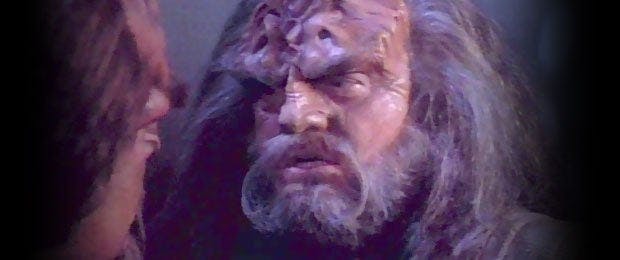
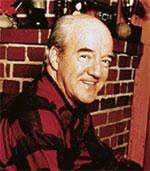
How aware were you of Star Trek before you appeared on TNG and Voyager?Herd: I was very aware of it. I had a lot of different kinds of connections. I had done T.J. Hooker with Bill Shatner. I did that for three years. Leonard guest starred on the show and directed an episode. We chatted a bit. We’re both from Boston. I’m from the south end and he’s from the east end. And I’d known about Star Trek. I’d watched some episodes of The Original Series. I saw one or two of the movies. Later, Walter Koenig and I toured in a play by David Mamet, called Duck Variations. And then a group of us got together and did that movie Roddenberry on Patrol. And in Roddenberry on Patrol I played Bill Shatner. I also knew Chris Pine when he was a kid. I worked with his father. His father is a wonderful man and a fine actor. How did the opportunity to play L’Kor in the “Birthright” two-parter come about?Herd: I auditioned. I knew that TNG was a good show. The part was a fine part. It was a classic kind of part, and I had classic background training. There’s a certain way you have to carry yourself. You have to really be able to project the violence and the anger. The most difficult thing for me, and I really worked diligently on it, was learning how to sing that song in Klingon. It was not easy.
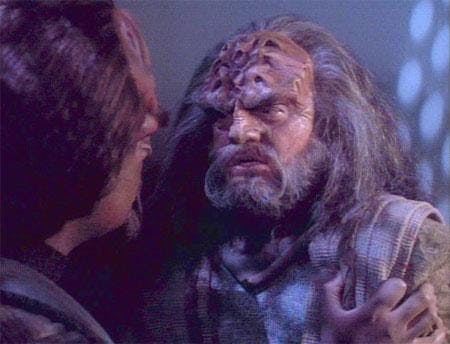
How do you prep to portray a Klingon?Herd: It’s like anything you play. You think about it. I knew people that had played Klingons. The Klingons are warriors. They have a certain amount of anger. There’s a great honor amongst them. All you have to do is think of the Spartans. They say, “They’d rather have you come home dead on your shield than come home a coward.” That’s the whole thing with “Birthright I and II,” that they were defeated and were knocked out and couldn’t return amongst the Klingon nation because they would have been shamed and dishonored. So they stayed there. So when Michael (Dorn), when Worf, went back, it was originally written that I was his father, but they changed it because he couldn’t leave his father with the Romulans. So he came back and forgot the whole thing, put it behind him. It was interesting.Also, if you watch closely, the warrior song is first sung as a lullaby by the half-Romulan/half-Klingon woman. It’s a lullaby. Then you hear it next with the older men, but then the younger Klingons, Worf tells them that it’s actually a warrior song. Later, in the second part, this young Klingon jumps up and sings it in a great warrior’s voice. So there’s a hell of a lot going on in the two-parter.How was the shoot, if you can remember?Herd: Oh, it was wonderful. The directors (Winrich Kolbe and Danny Curry) were wonderful. Michael Dorn was great to me. Everybody was very nice. Mike Westmore, the head of the Star Trek makeup department forever, I’d done a movie with him and Stallone called F.I.S.T., and I did a 10-hour miniseries with him called Ike: The War Years, where Bobby Duvall played Eisenhower and I played Omar Bradley. And, having been around, I knew quite a few of the crew people and a bunch of the actors. When I came back to do Voyager, a lot of the people from TNG had moved on to do Voyager.
This week marks the 20th anniversary of the premiere of “Birthright, Part 1.” How hard is it to fathom that 20 years have gone by?Herd: This year I’m celebrating 60 years as a professional actor. That’s 60 years in the theater, in film and in television. If you decide to do something and you agree to take the job, you have to bring your best to it. It’s up to you to bring excellence. Hopefully, everyone is bring excellence and rising to the moment with you. That happened on “Birthright.” Michael Dorn was very locked in, very focused. So I knew that we were working on something terrific. But I can’t believe it’s 20 years. I started in the business as a teenager, so it’s hard for me to comprehend that 60 years have gone by. So for me to comprehend that it’s 20 years since ‘Birthright”… You know what it’s like? It’s like you can just put out your hands and touch it. It’s gone by at warp speed.
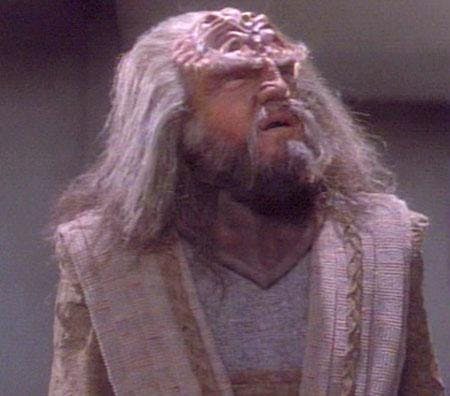
After you did those two episodes of TNG, were you up for any other roles on TNG or on DS9?Herd: No, not that I’m aware of. I never got a call for DS9, never got an audition. And, later, after Voyager, I didn’t get a call for Enterprise, and I was hoping to because I’d worked twice with one of my favorite actors, Scott Bakula, on two episodes of Quantum Leap. I played Captain Galaxy in one episode and (producer) Don Bellisario liked me so much he wrote me in for the show’s final episode. I’d love to have done more Star Trek. I’d love to do one of the new movies at some point.How did you land the role of Admiral Paris on Voyager?Herd: I went in and I auditioned. I got a callback and I went in again. And it popped. It was wonderful because I liked Robert Duncan McNeill, even though we actually didn’t work together. Working with Dwight Schultz and Richard McGonagle was a lot of fun. I really did enjoy working with Dwight. He’s wonderful. I haven’t seen him around recently, but he was terrific to work with, and McGonagle was very good, too.
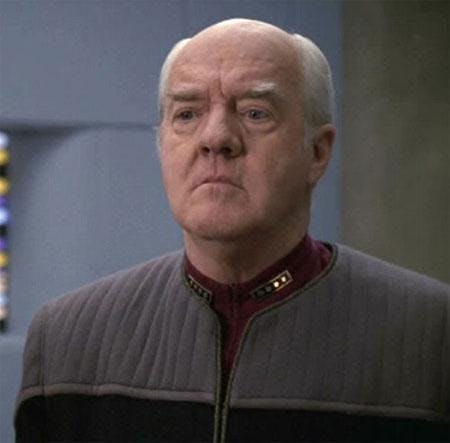
Visit StarTrek.com again tomorrow to read the second half of our interview with Richard Herd. And click HERE to visit Herd’s official site.

